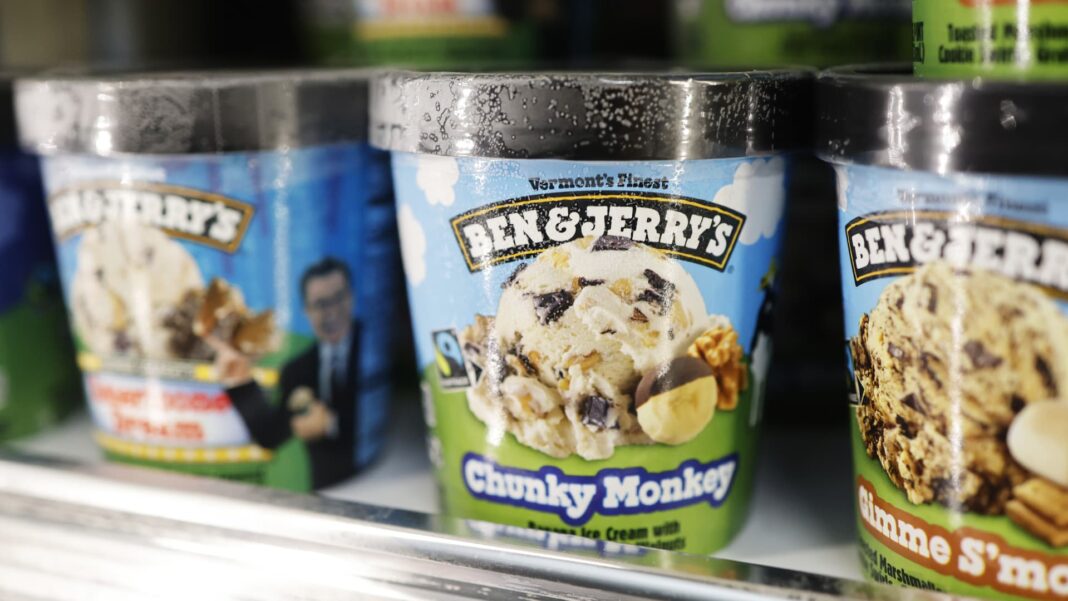Pints of Ben & Jerry’s ice cream are seen on a shelf at Ideal Fresh Market of Church Ave on March 19, 2024 in the Flatbush neighborhood of Brooklyn borough in New York City.
Michael M. Santiago | Getty Images
Consumer goods giant Unilever on Thursday posted slightly weaker-than-expected sales growth and pointed to a subdued start to 2025, although it expects this to reverse in the second half of the year.
The company also provided an update on the spin-off of its ice cream business, which houses brands including Ben and Jerry’s and Magnum, saying it would be demerged through a triple listing.
The maker of Dove soap and Hellmann’s mayonnaise posted a 4% rise in fourth-quarter underlying sales, slightly missing the 4.1% rise forecast in a company-compiled estimate.
Full-year underlying sales grew 4.2% versus a company-compiled analyst consensus of 4.3%. That was led by 2.9% volume growth. Underlying operating margins came in at 18.4% versus 18.3% estimated. Both figures were in line with the company’s full-year forecasts.
Shares of Unilever fell 6.7% at 09:29 a.m. London time.
CEO Hein Schumacher told CNBC Thursday that the growth was led by the company’s 30 so-called power brands — which include Dove, Comfort, Vaseline and Liquid I.V. — and were named as a key focus of the company’s growth action plan announced in November.
“The 30 power brands were actually growing ahead of the company average again in quarter four, 5.3%,” Schumacher told Julianna Tatelbaum.
Sharing its 2025 outlook, the British firm said it expected full-year sales growth in line with its multi-year range of 3% to 5%. It also said it anticipated a “modest improvement” in underlying operating margin, which would be realized in the second half of the year.
“We’re seeing markets slow. We see that continuing in quarter one. Despite markets … we aim to grow ahead of the competition. I feel that was what was done in 2024 and we want to do that again in quarter one, but we see more challenging circumstances overall,” Schumacher said.
Consumer goods companies have been under pressure over recent quarters as rising input costs have pushed prices higher and led consumers to switch to lower cost, private label alternatives.
Speaking to CNBC Wednesday, however, Jon Cox, head of European consumer equities at Kepler Cheuvreux, said it now looked as though the outlook for the sector may be looking up.
“Maybe the corner has turned after what has been a pretty dramatic couple of years in the consumer space,” Cox told CNBC’s “Street Signs Europe” on Wednesday.
“Going into this year, we should see a more normalized pricing environment but in addition, a lot of these guys are now investing more in new product development, bigger bolder innovations and at the same time marketing more extensively than they have.”
Cox added that these developments could reverse some of the share losses against private label goods and further accelerate volume growth.
Nestle, the world’s largest packaged food company, on Thursday posted full-year sales growth which was in-line with expectations while nevertheless down on the previous year. The Swiss company also pointed to an uptick in 2025 sales, barring any significant macroeconomic challenges.
Unilever’s Schumacher acknowledged a “bifurcation” of the consumer market, but said the firm was hopeful of regaining further share of pocket, particularly within its premium products line.
“Consumers, yes, they buy value but they also tend to buy more premiumized products,” he said
Ben & Jerry’s spin-off
Unilever, which is home to about 400 brands, is looking to sell several food lines with combined sales of around 1 billion euros ($1.04 billion), Schumacher told Dutch financial daily FD in December.
Schumacher did not name the specific brands, but it follows an announcement in March that Unilever in was spinning off its ice cream unit.
In an update Thursday, the company said the unit would be separated via a demerger, with listings in Amsterdam, London and New York — the same three exchanges on which Unilever shares are currently traded — and that it was on track to complete by the end of 2025.
“The de-merger is on track,” Schumacher told CNBC’s Julianna Tatelbaum, adding that Amsterdam would be the business’ primary listing.
Asked whether Unilever was still considering a possible sale of its ice cream unit, Schumacher said the company was “absolutely focused on getting the demerger done in a successful manner. That’s what all our actions are about.”



